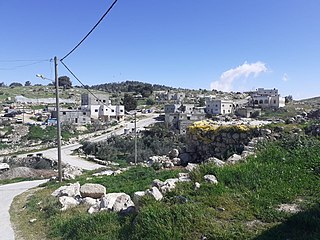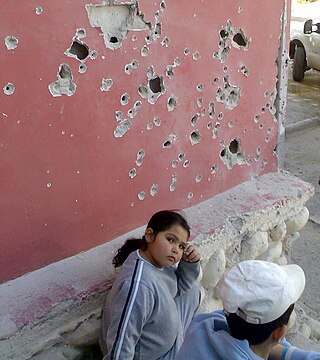Related Research Articles

Israeli settlements, also called Israeli colonies, are the civilian communities built by Israel throughout the Israeli-occupied territories. They are populated by Israeli citizens, almost exclusively of Jewish identity or ethnicity, and have been constructed on lands that Israel has militarily occupied since the Six-Day War in 1967. The international community considers Israeli settlements to be illegal under international law, but Israel disputes this. In 2024, the International Court of Justice (ICJ) found that Israel's occupation was illegal and ruled that Israel had "an obligation to cease immediately all new settlement activities and to evacuate all settlers" from the occupied territories. The expansion of settlements often involves the confiscation of Palestinian land and resources, leading to displacement of Palestinian communities and creating a source of tension and conflict. Settlements are often protected by the Israeli military and are frequently flashpoints for violence against Palestinians. Furthermore, the presence of settlements and Jewish-only bypass roads creates a fragmented Palestinian territory, seriously hindering economic development and freedom of movement for Palestinians.

The West Bank, so called due to its location relative to the Jordan River, is the larger of the two Palestinian territories. A landlocked territory near the coast of the Mediterranean Sea in the Levant region of West Asia, it is bordered by Jordan and the Dead Sea to the east and by Israel to the south, west, and north. The territory has been under illegal Israeli occupation since 1967.

―

Arab–Israeli peace projects are projects to promote peace and understanding between the Arab League and Israel in different spheres. These are part of a broader attempt at a peace process between Palestinians and Israelis. Sponsors of such projects can be found both in Israel and Palestine.
A suicide bombing of a crowded public bus in the Shmuel HaNavi quarter in Jerusalem took place on August 19, 2003. Twenty-four people were killed and over 130 wounded. Many of the victims were children, some of them infants. The Islamist militant group Hamas claimed responsibility for the attack.
The Palestinian NGOs Network is a non-profit, non-governmental organization with a mandate to protect the environment of Palestine by acting as a coordinating body for Palestinian environmental organizations located in the West Bank and Gaza Strip. PNGON was initiated after the 2000 al-Aqsa Intifada due to heightened demands for Palestinian environmental organizations to defend the Palestinian environment.

Breaking the Silence (BtS) is an Israeli non-governmental organization (NGO) established in 2004 by veterans of the Israel Defense Forces (IDF). It is intended to give serving and discharged Israeli personnel and reservists a means to confidentially recount their experiences in the Occupied Territories. Collections of such accounts have been published in order to educate the Israeli public about conditions in these areas.

Otniel is an Orthodox Israeli settlement in the West Bank. Located in the southern Judaean Mountains, south of Hebron, it falls under the jurisdiction of Har Hevron Regional Council. In 2022, it had a population of 1,041.

Carmel is an Israeli settlement organized as a moshav in the south-east Mount Hebron area of the West Bank. It falls under the jurisdiction of the Har Hevron Regional Council and associates ideologically with the Amana settlement movement. In 2022 it had a population of 465.
The Water, Sanitation and Hygiene Monitoring Program or WaSH MP is a local initiative that is responsible for monitoring the enduring crisis in the water sector in the Palestinian territories (oPt).
The ongoing conflict between Palestinians and Jewish Israeli settlers in the West Bank city of Hebron is part of the wider Israeli–Palestinian conflict. Hebron has a Palestinian majority, consisting of an estimated 208,750 citizens (2015) and a small Jewish minority, variously numbered between 500 and 800. The H1 sector of Hebron, home to around 170,000 Palestinians, is governed by the Palestinian Authority. H2, which was inhabited by around 30,000 Palestinians, is under Israeli military control with an entire brigade in place to protect some 800 Jewish residents living in the old Jewish quarter. As of 2015, Israel has declared that a number of special areas of Old City of Hebron constitute a closed military zone. Palestinians shops have been forced to close; despite protests Palestinian women are reportedly frisked by men, and residents, who are subjected every day to repeated body searches, must register to obtain special permits to navigate through the 18 military checkpoints Israel has set up in the city center.
The water resources of Palestine are de facto fully controlled by Israel, and the division of groundwater is subject to provisions in the Oslo II Accord.

Tawani or at-Tuwani is a small Palestinian village in the south Hebron Hills of the Hebron Governorate. Many of the village's residents live in caves. The village is located south-east of the village of Yatta. Approximately one kilometre away lies Tel Tuwani, near the Israeli settlement of Ma’on. Frequent disputes occur between at-Tawani's residents and settlers over land, roads and water resources. The village had a population of 194 residents in 2017.

Children and Children's rights have long been a focal point of the ongoing Israeli-Palestinian conflict, dating as early as the 1929 Hebron massacre and the 1948 Deir Yassin massacre, both of which claimed the lives of children, precipitating a long conflict that has often led to the displacement, injury, and death of youths. Youth exposure to hostilities increased notably during the First and Second Intifada, where harsh responses from Israeli forces towards Palestinian adolescents and children protesting the Israeli occupation led to the arrest and detention of many Palestinian youth, in addition to other human rights abuses.
The Israeli–Palestinian Joint Water Committee (JWC) is a joint Israeli–Palestinian authority, created in 1995 by the Oslo II Accord. Its purpose is to manage water and sewage related infrastructure in the West Bank, particularly to take decisions on maintenance of existing infrastructure and approval of new projects. Although it was originally intended to be a temporary organ for a five years interim period, it still exists as of 2015.
Al Baqa or Al Baqa'a, also spelled Al-Beqa or Al baqr, is a Palestinian village located just east of Hebron. It has been occupied by Israel since 1967, together with the rest of the West Bank. It is sandwiched between the Israeli settlements Givat Harsina and Kiryat Arba. Wadi al-Ghrous or Wadi al Gruz is a locality of Hebron that borders Al Baqa on the west.

Wadi al Hussein, sometimes referred to as 'Wadi Nasara, is a wadi east of and adjacent to the city of Hebron. The valley connects the Kiryat Arba settlement with the Israeli-controlled H2 area of Hebron's old city. The borders of the valley are Othman Bin Afan Street, also known as Zion Street or Worshipers' Way in the west; Wadi Al Nassara in the north; the Kiryat Arba fence in the east; Wadi Al Ghrous and the road connecting Kiryat Arba with Zion Street in the south.

Boycotts of Israel are the refusal and calls to refusal of having commercial or social dealings with Israel in order to influence Israel's practices and policies by means of using economic pressure. The specific objective of Israel boycotts varies; the Boycott, Divestment and Sanctions (BDS) movement calls for boycotts of Israel "until it meets its obligations under international law", and the purpose of the Arab League's boycott of Israel was to prevent Arab states and others to contribute to Israel's economy. Israeli officials have characterized the BDS movement as antisemitic.

Palestinians are the target of violence by Israeli settlers and their supporters, predominantly in the West Bank. In November 2021, Israeli Defense Minister Benny Gantz discussed the steep rise in the number of incidents between settlers and Palestinians in the West Bank, many of which result from attacks by residents of illegal settler outposts on Palestinians from neighboring villages. Settler violence also includes acts known as price tag attacks that are in response to actions by the Israeli government, usually against Palestinian targets and occasionally against Israeli security forces in the West Bank.
References
- ↑ PHG Website
- ↑ "Historical Background". Palestinian Hydrology Group. Retrieved 8 July 2021.
- ↑ Oxfam website Archived 2009-09-01 at the Wayback Machine
- ↑ Care Projects Archived 2008-11-20 at the Wayback Machine